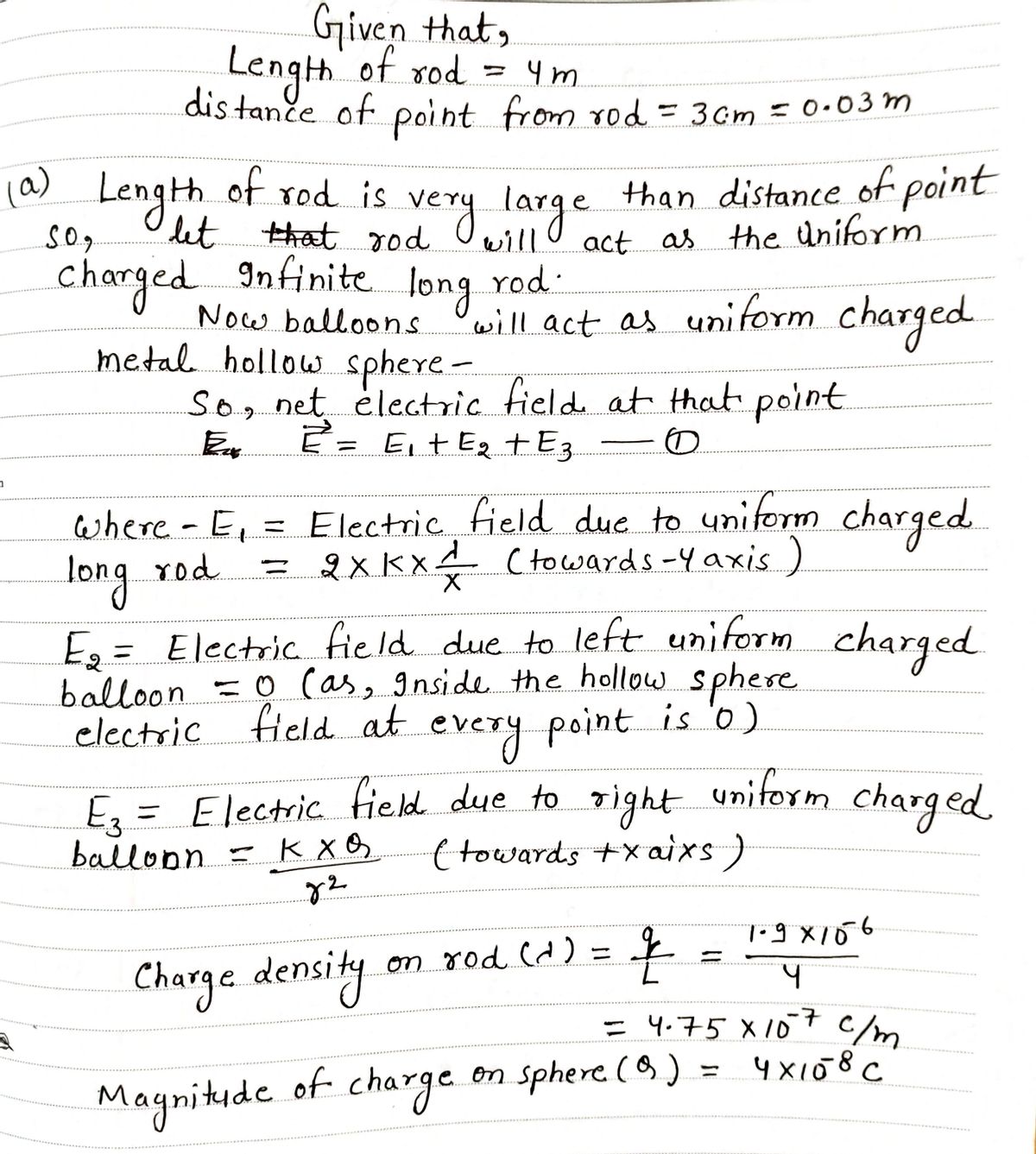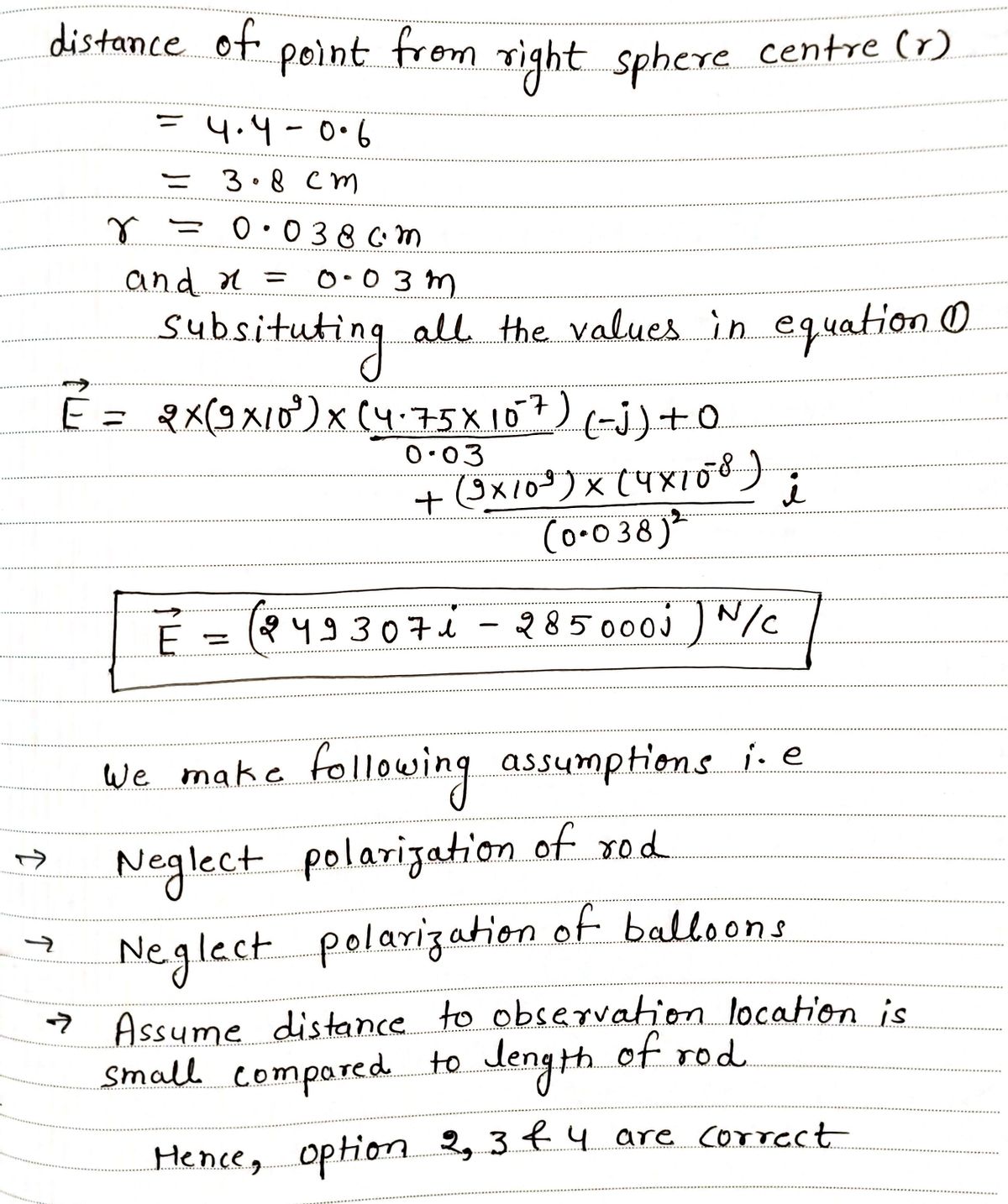A rod and two balloons A very thin glass rod 4 meters long is rubbed all over with a silk cloth. It gains a uniformly distributed charge 1.9 x 10-6 C. Two small spherical rubber balloons of radius 1.2 cm are rubbed all over with wool. They each gain a uniformly distributed charge of -4 x 10-8 C. The balloons are near the midpoint of the glass rod, with their centers 3 cm from the rod. The balloons are 2 cm apart (4.4 cm between centers). Length 4 m (drawing not to scale) 2 cm 3 cm Radius 1.2 cm 0.6 cm (a) Find the net electric field at the location marked by the x, 0.6 cm to the right of the center of the left balloon. Things to think about: Which objects make nonzero contributions to E at this location? What are the correct distances from sources to the observation location? What is the direction of E due to the rod? (The drawing is not to scale; read the problem statement carefully. Assume the +x axis is to the right, the +y axis is up, and the +z axis is out.) E = N/C What approximations did you make, if any? Check all that apply. Use approximate formula for electric field of a charged spherical shell. O Neglect polarization of rod O Neglect polarization of balloons O Assume distance to observation location small compared to length of rod (b) Next a proton is placed at that same location (marked by the x). What is the force acting on the proton? F= 4.03 - 1013 X N
A rod and two balloons A very thin glass rod 4 meters long is rubbed all over with a silk cloth. It gains a uniformly distributed charge 1.9 x 10-6 C. Two small spherical rubber balloons of radius 1.2 cm are rubbed all over with wool. They each gain a uniformly distributed charge of -4 x 10-8 C. The balloons are near the midpoint of the glass rod, with their centers 3 cm from the rod. The balloons are 2 cm apart (4.4 cm between centers). Length 4 m (drawing not to scale) 2 cm 3 cm Radius 1.2 cm 0.6 cm (a) Find the net electric field at the location marked by the x, 0.6 cm to the right of the center of the left balloon. Things to think about: Which objects make nonzero contributions to E at this location? What are the correct distances from sources to the observation location? What is the direction of E due to the rod? (The drawing is not to scale; read the problem statement carefully. Assume the +x axis is to the right, the +y axis is up, and the +z axis is out.) E = N/C What approximations did you make, if any? Check all that apply. Use approximate formula for electric field of a charged spherical shell. O Neglect polarization of rod O Neglect polarization of balloons O Assume distance to observation location small compared to length of rod (b) Next a proton is placed at that same location (marked by the x). What is the force acting on the proton? F= 4.03 - 1013 X N
College Physics
11th Edition
ISBN:9781305952300
Author:Raymond A. Serway, Chris Vuille
Publisher:Raymond A. Serway, Chris Vuille
Chapter1: Units, Trigonometry. And Vectors
Section: Chapter Questions
Problem 1CQ: Estimate the order of magnitude of the length, in meters, of each of the following; (a) a mouse, (b)...
Related questions
Question

Transcribed Image Text:A rod and two balloons
A very thin glass rod 4 meters long is rubbed all over with a silk cloth. It gains a uniformly distributed charge 1.9 x 10-6 C. Two small spherical rubber balloons of radius 1.2 cm are rubbed all over with wool. They each gain a uniformly distributed
charge of -4 x 10-8 C. The balloons are near the midpoint of the glass rod, with their centers 3 cm from the rod. The balloons are 2 cm apart (4.4 cm between centers).
Length 4 m (drawing not to scale)
2 cm
3 сm
Radius 1.2 cm
0.6 cm
(a) Find the net electric field at the location marked by the x, 0.6 cm to the right of the center of the left balloon. Things to think about: Which objects make nonzero contributions to E at this location? What are the correct distances from
sources to the observation location? What is the direction of E due to the rod? (The drawing is not to scale; read the problem statement carefully. Assume the +x axis is to the right, the +y axis is up, and the +z axis is out.)
N/C
What approximations did you make, if any? Check all that apply.
Use approximate formula for electric field of a charged spherical shell.
Neglect polarization of rod
O Neglect polarization of balloons
M Assume distance to observation location is small compared to length of rod
(b) Next a proton is placed at that same location (marked by the x). What is the force acting on the proton?
F = 4.03 · 10-13
Expert Solution
Step 1


Step by step
Solved in 2 steps with 3 images

Knowledge Booster
Learn more about
Need a deep-dive on the concept behind this application? Look no further. Learn more about this topic, physics and related others by exploring similar questions and additional content below.Recommended textbooks for you

College Physics
Physics
ISBN:
9781305952300
Author:
Raymond A. Serway, Chris Vuille
Publisher:
Cengage Learning

University Physics (14th Edition)
Physics
ISBN:
9780133969290
Author:
Hugh D. Young, Roger A. Freedman
Publisher:
PEARSON

Introduction To Quantum Mechanics
Physics
ISBN:
9781107189638
Author:
Griffiths, David J., Schroeter, Darrell F.
Publisher:
Cambridge University Press

College Physics
Physics
ISBN:
9781305952300
Author:
Raymond A. Serway, Chris Vuille
Publisher:
Cengage Learning

University Physics (14th Edition)
Physics
ISBN:
9780133969290
Author:
Hugh D. Young, Roger A. Freedman
Publisher:
PEARSON

Introduction To Quantum Mechanics
Physics
ISBN:
9781107189638
Author:
Griffiths, David J., Schroeter, Darrell F.
Publisher:
Cambridge University Press

Physics for Scientists and Engineers
Physics
ISBN:
9781337553278
Author:
Raymond A. Serway, John W. Jewett
Publisher:
Cengage Learning

Lecture- Tutorials for Introductory Astronomy
Physics
ISBN:
9780321820464
Author:
Edward E. Prather, Tim P. Slater, Jeff P. Adams, Gina Brissenden
Publisher:
Addison-Wesley

College Physics: A Strategic Approach (4th Editio…
Physics
ISBN:
9780134609034
Author:
Randall D. Knight (Professor Emeritus), Brian Jones, Stuart Field
Publisher:
PEARSON